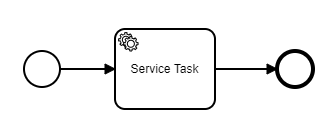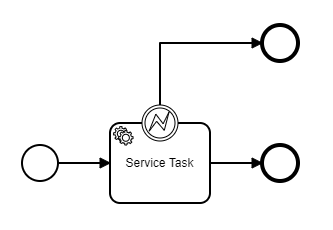Given the following process definitions:
Without boundary event:

With boundary event:

The above service task is implemented using a JavaDelegate, and when the underlying service spits an error, a BpmnError is thrown:
throw new BpmnError("TheErrorCode", "The Error Message");
Now, the problem arises when no Boundary Event was supplied, in the case of the first example (“Without boundary event”). In this situation, the process exits with the following message:
ENGINE-02042 Execution with id 'ServiceTask01' throws an error event with errorCode 'TheErrorCode', but no error handler was defined.
The information of the actual error disappears, which makes it fairly hard to find out why the task failed.
So what I want to do, is throw a BpmnError when a Boundary Event was supplied, but throw a regular exception when it was not. Eg:
if (hasErrorBoundary) {
throw new SomeException("The Error Message");
} else {
throw new BpmnError("TheErrorCode", "The Error Message");
}
In order to do this, I need to know whether an Error Boundary Event is supplied, and preferably, if it actually handles the thrown error code.
I found this code that seems to handle that in the engine itself:
Which not only provides information about any of the error boundaries, but also whether they handle the exception. However, I’m not getting the same result when I try this in my delegate:
DeploymentCache deploymentCache = Context.getProcessEngineConfiguration().getDeploymentCache();
ProcessDefinitionEntity processDefinitionEntity = deploymentCache.findDeployedProcessDefinitionById(delegateExecution.getProcessDefinitionId());
List<ErrorEventDefinition> errorEventDefinitions = processDefinitionEntity.getProperties().get(BpmnProperties.ERROR_EVENT_DEFINITIONS);
After which the “errorEventDefinitions” list is empty.
I’ve tried getting all properties, to see which ones are available:
Properties props = processDefinitionEntity.getProperties();
for (Map.Entry<String, Object> entry : props.toMap().entrySet()) {
_logger.warning("Prop: " + entry.getKey());
}
Resulting in the following:
Prop: taskPriority
Prop: jobPriority
Prop: documentation
So that looks like it’s not even the right process definition, or I’m probably doing something wrong here.
Could anyone give some pointers on how to check whether a BpmnError would be handled by a boundary event, or that it would result in a “ENGINE-02042 - (…) no error handler was defined” error?